Lisbon Travel Guide: Top Tips for a Memorable Stay
Lisbon Travel Guide: Top Tips for a Memorable Stay
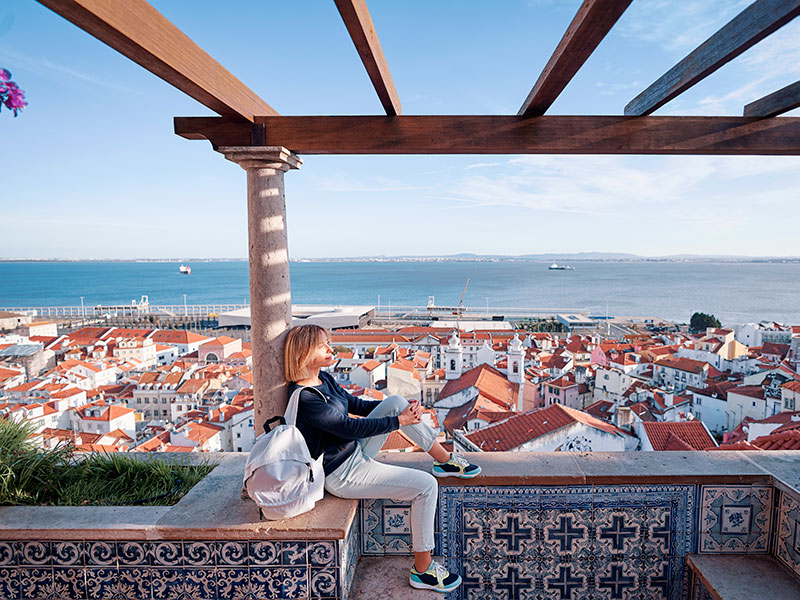
Complete Lisbon Travel Guide for a Memorable Stay
Introduction to Lisbon: The Jewel of Portugal’s Atlantic Coast
Lisbon, Portugal’s dazzling capital city, beckons travelers from around the globe to explore its unique blend of old-world charm and modern vibrancy. Whether you’re drawn to historic landmarks, buzzing nightlife, or delectable cuisine, Lisbon has something for every traveler. Situated at the mouth of the Tagus River, the city offers a splendid mix of scenic beauty and cultural richness, making it a must-visit European destination.
A Melting Pot of Cultures
What makes Lisbon stand out is its cosmopolitan soul, deeply rooted in a rich tapestry of cultures. Influences from Africa, Asia, and South America have enriched the city’s architectural, culinary, and musical landscapes. Walking down its cobblestone streets, you’ll hear a multitude of languages and see an array of artistic styles that mirror the city’s global outlook.
History at Every Turn
As one of the oldest cities in Western Europe, predating other European capitals like Paris and Rome by centuries, Lisbon offers a fascinating historical backdrop. Its past is replete with maritime discoveries, which opened new routes to India, Africa, and Brazil. Monuments like Belém Tower and Jerónimos Monastery stand as living testimonies to the city’s glorious past, making it an intriguing destination for history enthusiasts.
A Hub for Economic Activity
Lisbon is not only a tourist paradise but also a significant hub for economic activities in Portugal and the European Union. The city boasts a bustling financial district and a booming tech scene, attracting businesses and investors alike. Its ports serve as gateways for international trade, and its airport connects travelers to various destinations across the globe.
Natural Beauty Abounds
Spectacular viewpoints, or “miradouros,” dot the city, offering panoramic vistas of terracotta rooftops, azure waters, and rolling hills. Take a romantic sunset sail along the Tagus River or enjoy the lush greenery in one of its many parks. The natural beauty of Lisbon provides a perfect backdrop for outdoor adventures and Instagram-worthy photos.

An Arts and Culture Haven
Art aficionados and music lovers will find their niche in Lisbon. Whether it’s the soul-stirring tunes of Fado music or the intricate designs of Azulejos tiles, the city is a treasure trove of artistic expressions. Numerous galleries, music venues, and cultural festivals ensure that there’s always something happening in Lisbon’s creative scene.
Conclusion
In a nutshell, Lisbon is a city that captivates and enchants, offering a multifaceted experience that appeals to a wide range of interests. Its unique mix of traditional and modern, along with its cosmopolitan flair, make it a must-visit for anyone planning a European getaway. With so much to see, do, and explore, Lisbon truly stands as the jewel of Portugal’s Atlantic coast, promising an unforgettable travel experience for all who visit.
Historical Landmarks in Lisbon: A Journey Through Time and Elegance
A City Steeped in History
Lisbon, the capital city of Portugal, is not just a modern European destination but a treasure trove of historical landmarks. As one of the oldest cities in Western Europe, its rich history is manifested in various monuments, fortresses, and buildings that speak volumes about its past. This article aims to guide you through some of these remarkable landmarks, weaving the intricate tapestry that makes Lisbon so captivating.
Belém Tower: A Sentinel of Maritime Glory
One cannot visit Lisbon without paying homage to the iconic Belém Tower. Situated at the mouth of the Tagus River, this UNESCO World Heritage site was initially built as a defensive fortress and later transformed into a gateway for explorers. It serves as a testament to Portugal’s Age of Exploration and is a must-visit for anyone interested in maritime history.

Jerónimos Monastery: The Jewel of Manueline Architecture
The Jerónimos Monastery is another landmark that stands as a symbol of Portugal’s grandeur during its age of discoveries. This monastery is an architectural marvel, showcasing the Manueline style unique to Portugal. Apart from its stunning facade, the monastery is home to the tombs of some of Portugal’s most significant figures, including Vasco da Gama and Luís de Camões.

St. George’s Castle: The Keeper of Lisbon’s History
Perched atop a hill overlooking the historic center of Lisbon, St. George’s Castle has seen rulers from the Moors to the Reconquista knights. While much of its original structure has been renovated or rebuilt, the castle offers a panoramic view of the city and the Tagus River, making it a popular spot for photographs and a poignant reminder of Lisbon’s diverse history.
Alfama District: A Living Museum
Alfama, Lisbon’s oldest district, is a labyrinth of narrow streets, ancient houses, and traditional Fado music bars. The district survived the devastating 1755 earthquake, retaining its Moorish architectural influences and unique character. It’s a living museum where you can experience Lisbon’s history up close.
Carmo Convent: The Silent Witness
Another striking landmark is the Carmo Convent, a roofless Gothic church that stands as a silent witness to the 1755 earthquake’s destruction. Visiting the ruins offers an eerie yet fascinating journey into Lisbon’s resilience and recovery after one of its most tragic events.
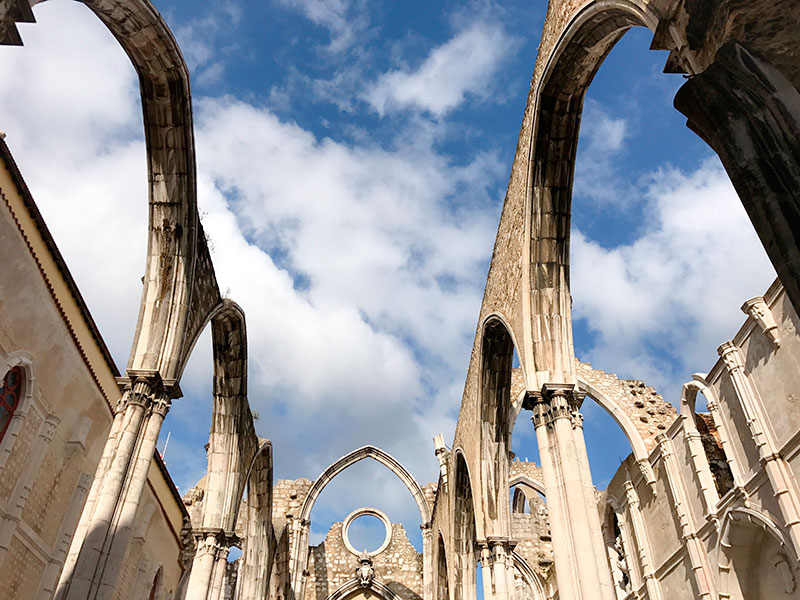
Águas Livres Aqueduct: The Engineering Marvel
Built in the 18th century, the Águas Livres Aqueduct is an engineering marvel that has provided Lisbon with fresh water for centuries. The aqueduct spans several kilometers and is an awe-inspiring sight to behold, especially considering the engineering capabilities of the time.
Conclusion
Lisbon’s historical landmarks are not just structures of stone and mortar; they are narrators of tales, keepers of secrets, and symbols of a bygone era that has shaped the modern city. From maritime glory symbolized by Belém Tower to the cultural amalgamation reflected in Alfama, Lisbon offers a rich tapestry of historical experiences that no traveler should miss.
Culture and Arts in Lisbon: A Celebration of Creativity and Heritage
A City That Breathes Culture
When you think of Lisbon, it’s not just the scenic vistas or historic landmarks that capture your imagination. The city is also a melting pot of diverse cultural influences, manifested in its arts, music, and festivals. This richness creates an incredible tapestry of experiences that appeal to cultural aficionados and casual visitors alike. Let’s delve into the extraordinary world of Lisbon’s culture and arts.
Fado Music: The Soul of Lisbon
If there’s one thing synonymous with Lisbon’s cultural scene, it’s Fado. This traditional genre of Portuguese music is characterized by its melancholic tunes and poetic lyrics. Fado is not just music; it’s an expression of the Portuguese soul. You can experience live Fado performances in various venues, especially in the Alfama district, offering a deeply emotional and culturally enriching experience.

Azulejos: The Art of Ceramic Tiles
Another iconic representation of Lisbon’s artistic prowess is the Azulejos, ceramic tiles adorned with complex patterns or scenes. You’ll find them embellishing buildings, walls, and even floors throughout the city. These tiles not only add to Lisbon’s aesthetic appeal but also serve as a historical document, recounting tales from the past through intricate designs.
Street Art: A Modern Cultural Phenomenon
In recent years, Lisbon has become a hub for street art, with talented local and international artists transforming its urban landscapes into open-air galleries. Whether it’s a political statement or a whimsical mural, the city’s street art adds a contemporary layer to its rich cultural tapestry.
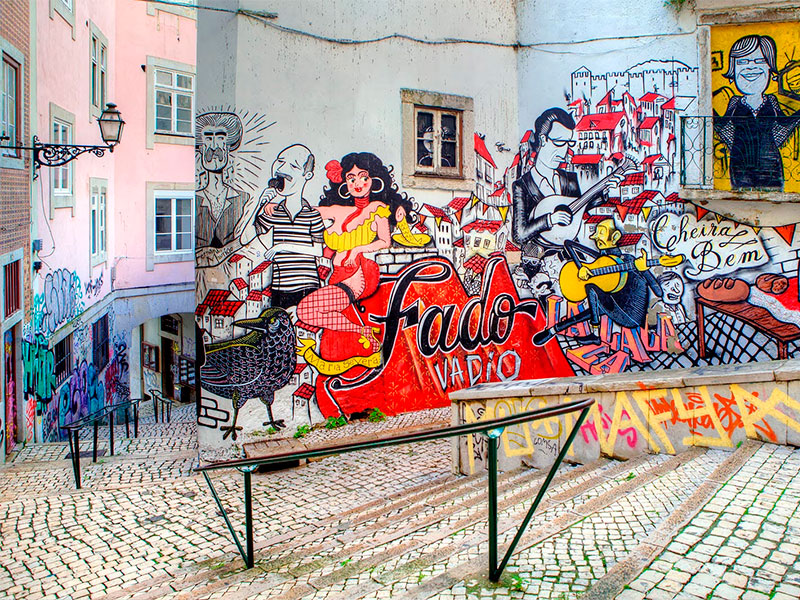
Traditional Festivals: Lisbon’s Calendar of Joy
Lisbon’s festivals are a celebration of its cultural diversity and historical roots. The most famous is perhaps the Festa de Santo António, where the streets come alive with parades, music, and dance. These festivals offer a unique insight into the local traditions and are a must-experience for anyone visiting the city.
Galleries and Museums: The Custodians of Art
If you’re an art enthusiast, Lisbon has a plethora of galleries and museums to explore. From classical art at the Calouste Gulbenkian Museum to contemporary pieces at the Berardo Collection Museum, there’s something to suit every artistic palate.
Literature and Theater: Stages and Pages
Lisbon has a rich literary history, being the birthplace of renowned poets like Fernando Pessoa. The city’s bookstores and libraries, such as the stunning Ler Devagar, are havens for bibliophiles. Likewise, Lisbon’s theaters, like Teatro Nacional D. Maria II, provide a platform for a range of performances, from classical to avant-garde.
Conclusion
Lisbon’s culture and arts are as diverse as they are enriching. From the soul-stirring melodies of Fado to the vivid scenes depicted in Azulejos tiles, every aspect is a tribute to the city’s multifaceted identity. The arts and culture of Lisbon are not just for observation but for deep, immersive participation. They offer a window into the Portuguese soul and an essential part of the unforgettable Lisbon experience.
Local Cuisine in Lisbon: A Culinary Voyage Through Portugal’s Capital
A Symphony of Flavors
Lisbon, renowned for its historic landmarks and vibrant culture, is also a paradise for food lovers. The city’s culinary landscape is as diverse as its cultural heritage, offering an array of flavors that make dining here an unforgettable experience. From delectable seafood dishes to sweet pastries, Lisbon’s local cuisine is a gastronomic journey you’ll want to embark upon.
Seafood: A Coastal Delight
Given Lisbon’s location along the Atlantic coast, it’s no surprise that seafood dominates the local cuisine. Bacalhau, or codfish, often called the “faithful friend” of the Portuguese, is prepared in countless ways, from grilled to baked. Another must-try is the Ameijoas à Bulhão Pato, a delectable dish featuring clams seasoned with garlic and cilantro.
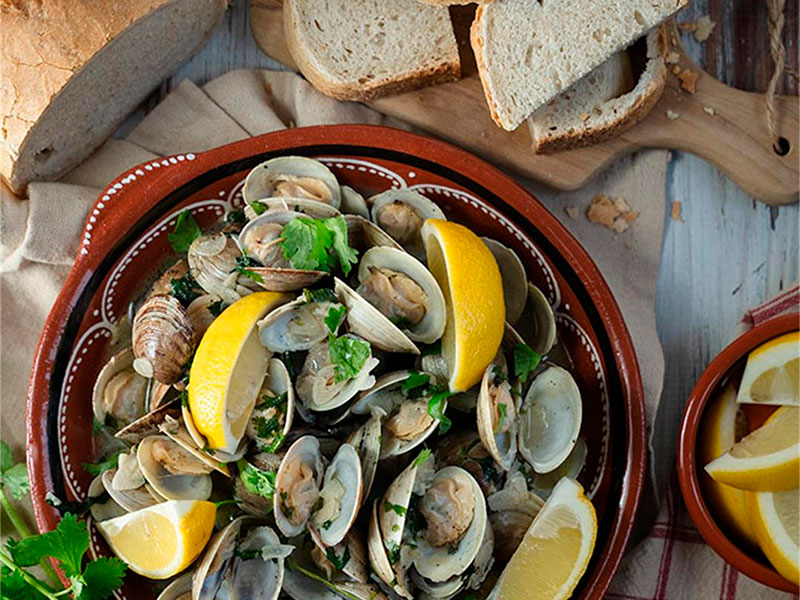
Pastéis de Nata: A Sweet Affair
When it comes to desserts, Lisbon has a hidden gem that has captivated both locals and tourists alike: the Pastéis de Nata. These custard tarts, often enjoyed with a sprinkle of cinnamon and powdered sugar, are a true Lisbon staple. No visit to the city is complete without trying these delicious pastries, best sampled at the historic Pastéis de Belém bakery.
Wine and Ginjinha: The Spirits of Lisbon
Portugal is famous for its wines, and Lisbon is no exception. Whether it’s the effervescent Vinho Verde or the more robust reds, there’s a wine for every palate. For a more local experience, try Ginjinha, a cherry liqueur often served in chocolate cups. This local spirit encapsulates the essence of Lisbo
n and is a must-try for any visitor.
Mercado da Ribeira: A Culinary Hub
If you’re looking to explore a wide range of Lisbon’s culinary offerings in one place, head to Mercado da Ribeira. Also known as Time Out Market, this bustling food hall brings together some of the city’s best chefs and food stalls, offering everything from traditional Portuguese dishes to international cuisines.
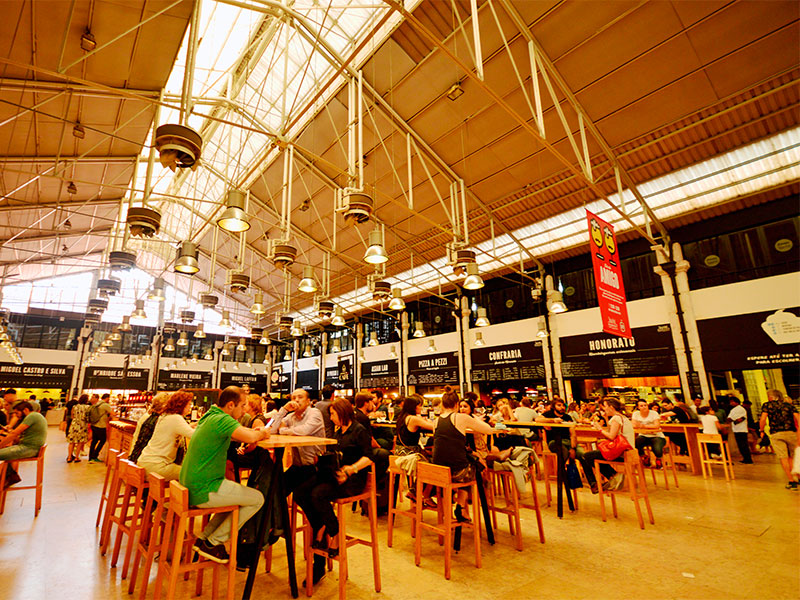
Fusion Cuisine: A Blend of Influences
Given Lisbon’s history as a maritime nation, it’s no surprise that its cuisine reflects a blend of influences from Africa, Asia, and South America. Whether it’s a spicy Mozambique-style chicken or Brazilian-inspired seafood stew, Lisbon’s culinary scene is an eclectic mix that caters to a broad spectrum of tastes.
Alfresco Dining: Enjoying Lisbon’s Climate
One of the best ways to experience Lisbon’s cuisine is by dining alfresco. The city’s Mediterranean climate makes it perfect for outdoor dining almost year-round. Enjoying a meal on a sun-drenched patio or along the riverside provides not just great food but a scenic backdrop that enhances the overall dining experience.
Conclusion
From the seafood-infused delicacies of the coast to the mouth-watering desserts and diverse international influences, Lisbon’s culinary scene is a gastronomic treasure trove waiting to be explored. Each dish, drink, and dining venue offers a unique flavor of this captivating city, making it a must-visit destination for any food lover.
Shopping Districts in Lisbon: From Vintage Finds to Luxury Labels
The Capital of Retail Delight
Lisbon is a destination that offers more than just historical landmarks and culinary delights; it’s a shopper’s paradise. Whether you’re hunting for artisanal crafts, high-end fashion, or eclectic antiques, Lisbon’s shopping districts offer a diverse range of options that cater to every budget and taste.
Baixa: The Heart of Lisbon’s Shopping Scene
In the downtown area of Lisbon, also known as Baixa, you’ll find an array of shops that offer everything from Portuguese souvenirs to international brands. The pedestrian-friendly streets like Rua Augusta are lined with boutiques and cafes, making it a lively area to spend an afternoon shopping and people-watching.
Chiado: The Epitome of Elegance
Chiado is the district for those who appreciate the finer things in life. Famed for its luxury boutiques and designer stores, it’s where fashionistas can find high-end brands like Louis Vuitton and Hermès. The iconic Armazéns do Chiado shopping center is also located here, hosting a selection of both international and Portuguese brands.
Bairro Alto: Vintage Treasures and Artisanal Crafts
If you’re looking for something unique, Bairro Alto is the district to explore. Known for its bohemian atmosphere, the area is filled with vintage shops, independent boutiques, and artisanal craft stores. Don’t miss the LX Factory, a converted industrial complex that’s now a vibrant cultural space with trendy shops and art installations.
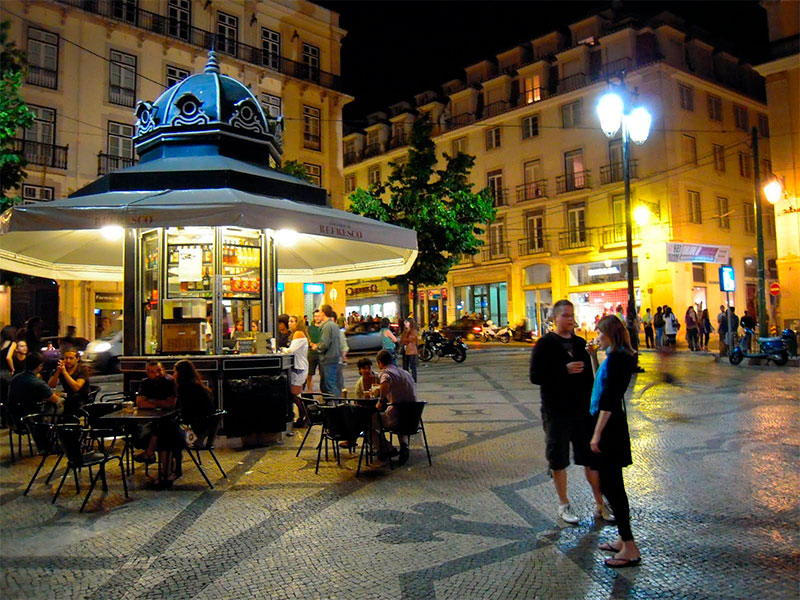
Alfama: For the Lovers of Tradition
The ancient district of Alfama is not only famous for its Fado clubs but also for its traditional shops selling Portuguese crafts, ceramics, and textiles. It’s the perfect place to pick up unique souvenirs like Azulejos tiles or cork products that Portugal is renowned for.
Príncipe Real: The Avant-Garde Hub
This is where the trendy crowd goes to shop. Príncipe Real offers an array of stylish boutiques and concept stores that feature everything from contemporary Portuguese designers to international indie labels. The district also hosts a biological market every Saturday, offering organic produce and artisanal goods.
Amoreiras: The All-In-One Shopping Experience
For those who prefer to do their shopping under one roof, Amoreiras Shopping Center provides a comprehensive shopping experience. With over 200 stores, including fashion, technology, and lifestyle brands, it’s a convenient one-stop destination for retail therapy.
Avenida da Liberdade: Designer Boutiques and High-End Brands
If luxury shopping is your passion, head straight to Avenida da Liberdade. This boulevard, often compared to Paris’s Champs-Élysées, hosts a slew of high-end boutiques and international designer stores, making it the epitome of luxury retail in Lisbon.
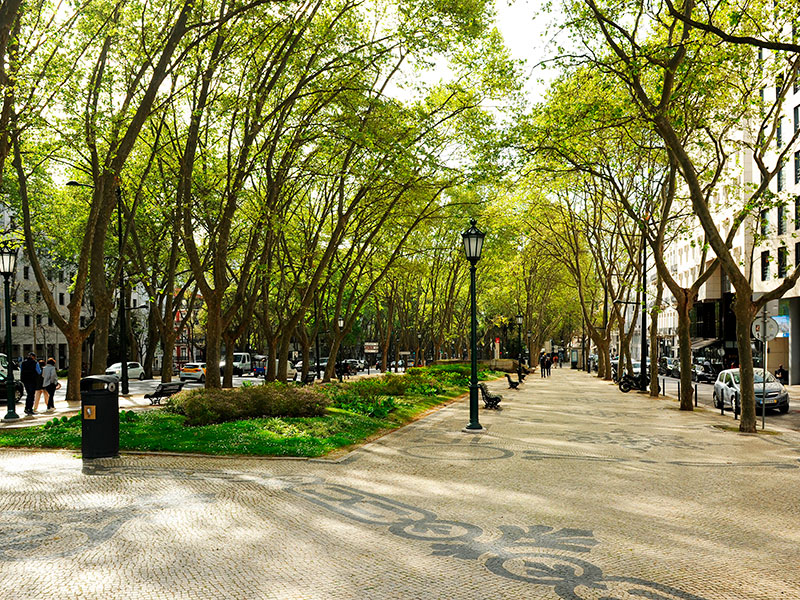
Conclusion
Whether you’re a shopaholic hunting for the next best thing or a discerning buyer looking for quality souvenirs, Lisbon’s shopping districts offer a myriad of choices that go beyond the ordinary. From the bustling streets of Baixa to the upscale boutiques in Chiado, each district offers a unique shopping experience that is a testament to Lisbon’s diverse and cosmopolitan nature.
Nightlife in Lisbon: An Exhilarating Blend of Tradition and Modernity
The City that Never Sleeps
When the sun sets over the picturesque cityscape of Lisbon, the capital undergoes a magical transformation. A city known for its rich history and scenic beauty becomes a hub of nocturnal activities, beckoning everyone from party-goers to cultural enthusiasts. Whether it’s the soulful strains of Fado music, the electrifying atmosphere of nightclubs, or the romantic allure of rooftop bars, Lisbon’s nightlife is a versatile affair that caters to a myriad of preferences.
Fado Houses: Melodies of the Night
A quintessential Lisbon experience involves spending an evening in one of its renowned Fado houses, especially in the Alfama or Mouraria districts. These intimate venues offer a chance to relish the soulful Portuguese music genre, often accompanied by a delicious local meal. An evening of Fado provides a deeply emotional experience, capturing the essence of the Portuguese soul.
Bairro Alto: The Party District
For a more spirited evening, head to Bairro Alto, Lisbon’s bustling nightlife district. The narrow, cobbled streets come alive with bars, nightclubs, and street parties that last until the wee hours. From traditional Portuguese taverns to modern craft beer bars, there’s something for every type of reveler.
Cais do Sodré: A Melting Pot of Musical Tastes
The district of Cais do Sodré offers a different yet equally exciting nightlife experience. Known for its musical diversity, this area has venues where you can dance to anything from electronic beats to Afro-Portuguese rhythms. The famed “Pink Street” is a must-visit, with its eclectic range of bars and clubs.
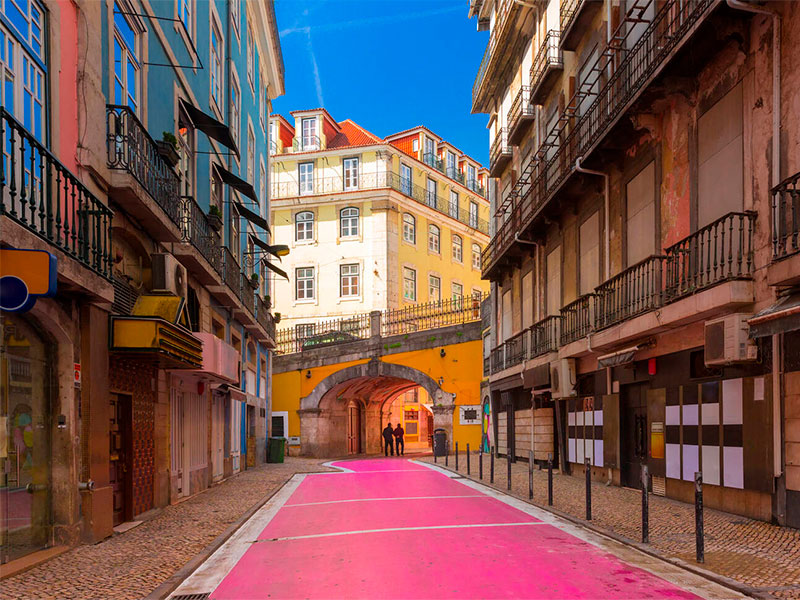
Rooftop Bars: Panoramic Pleasures
For those who prefer a more laid-back experience, Lisbon’s array of rooftop bars offer the perfect setting. With stunning views of the city’s landmarks and the Tagus River, these venues are ideal for a romantic evening or a relaxed night out with friends. PARK Bar and Sky Bar are among the top choices for elevated nightlife experiences.
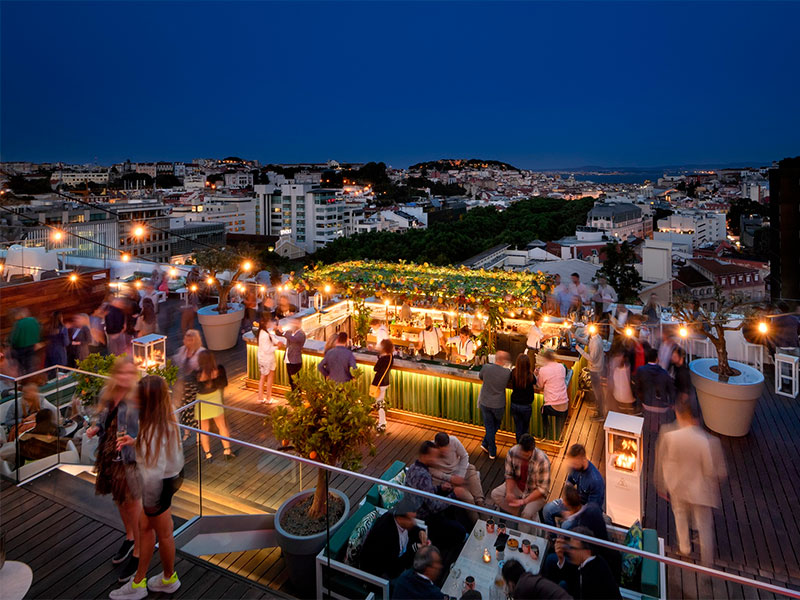
Cultural Evenings: Operas, Concerts, and Theaters
If you’re more inclined towards cultural activities, Lisbon doesn’t disappoint. The city boasts several theaters and concert halls where you can enjoy everything from classical operas to contemporary performances. Venues like Teatro Nacional D. Maria II and the Calouste Gulbenkian Foundation are worth checking out for their eclectic programming.
Riverfront Escapades: Nightlife by the Tagus
The area along the Tagus River offers another dimension to Lisbon’s nightlife. Modern, stylish bars and clubs like LuxFragil provide an exclusive atmosphere where you can dance the night away, right by the water’s edge.
Conclusion
Whether you’re a fan of traditional Portuguese music, an avid club-goer, or someone who appreciates a quiet evening with a view, Lisbon’s nightlife is a captivating blend of the old and the new. With its diverse range of activities and venues, the city promises an unforgettable nocturnal experience that complements its daytime attractions in a unique and exciting way.
Public Transportation in Lisbon: Your Passport to the City
A Seamless Network
When it comes to exploring the myriad attractions that Lisbon has to offer, few things are as crucial as understanding the city’s public transportation system. Efficient, well-maintained, and user-friendly, Lisbon’s public transit offers a range of options, including trams, buses, metros, and ferries, ensuring that all of the city’s neighborhoods and key landmarks are easily accessible.
The Iconic Trams: Step Back in Time
For a true taste of Lisbon’s past meshing with its present, hop on one of the iconic yellow trams. The most famous route, the 28 Tram, weaves through many of Lisbon’s most historic districts including Alfama, Graca, and Baixa. These trams don’t just offer a convenient means of transport; they’re an experience in themselves.
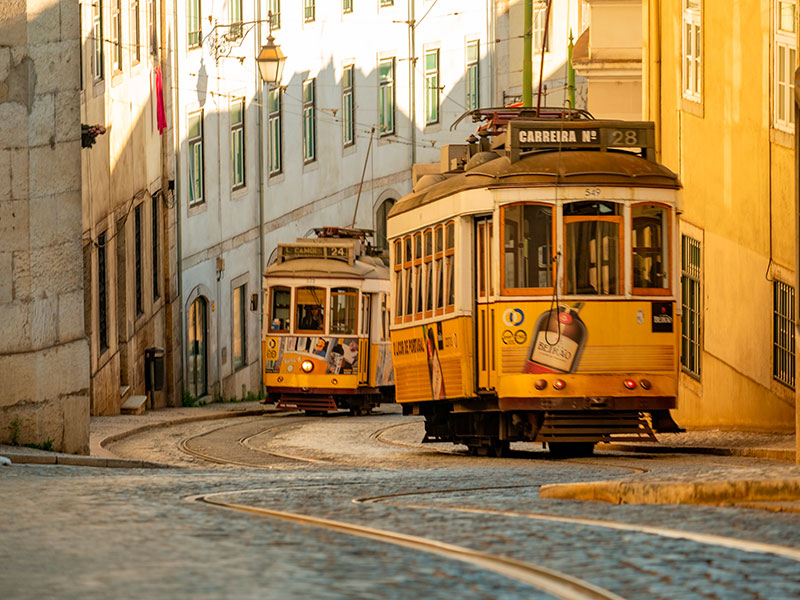
The Metro: Fast and Efficient
The Lisbon Metro is often the go-to choice for both locals and tourists alike. With frequent services and clean, well-signed stations, it’s one of the quickest ways to move around the city. The metro system is particularly useful for reaching areas like the airport and Oriente Station, making it convenient for those on the go.
Buses: Covering Every Nook and Cranny
For areas not served by the Metro or tram, Lisbon’s extensive bus network steps in. These buses are especially useful for reaching the less touristy but equally fascinating neighborhoods. Many buses are equipped with modern amenities, and some even offer panoramic views of the city.
Ferries: A Scenic Voyage
The city’s public ferries are not only an essential form of transit for many locals, but they also offer some of the best views of Lisbon’s skyline. A short trip across the Tagus River can be a delightful experience, providing a unique perspective on sites like the Monument to the Discoveries and the Belem Tower.
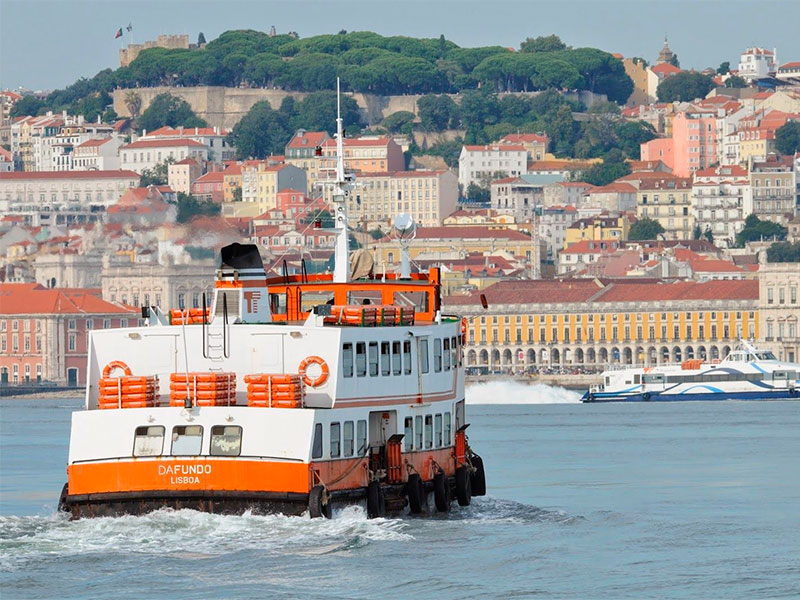
Tickets and Passes: Making Your Journey Easier
Navigating the payment system is made easy with a range of ticket and pass options. The Viva Viagem card, which is reloadable and can be used on all forms of public transit, offers a hassle-free way to travel around Lisbon. Tourists may also consider the Lisboa Card for unlimited use of public transportation and additional perks like free or discounted entry to many attractions.
Accessibility: For Everyone and Everywhere
Lisbon’s commitment to making its public transportation accessible is noteworthy. Most metro stations, buses, and even some trams are designed to accommodate passengers with mobility challenges, ensuring that the city is accessible to everyone.
Navigating Safely: Tips and Guidelines
While Lisbon’s public transportation is generally safe and reliable, it’s always wise to remain vigilant, especially during crowded times. Keep an eye on your belongings and be mindful of the designated stops to make your journey smooth and enjoyable.
Conclusion
Lisbon’s public transportation system is a testament to the city’s blend of tradition and modernity. Its range of options ensures that whether you’re a history buff aiming to visit every museum or a beach-goer headed for the coast, getting there will be a breeze. From the charming trams to the efficient metro, Lisbon’s public transit is your passport to a city ripe for exploration.
Day Trips from Lisbon: Unveil the Secrets of Portugal’s Surroundings
A Gateway to Discovery
While the charms of Lisbon are innumerable, the city also serves as an ideal base for exploring some of Portugal’s most captivating destinations. Whether you’re an admirer of historical landmarks, a lover of natural beauty, or a connoisseur of regional cuisine, the day-trip options from Lisbon are as diverse as they are enchanting.
Sintra: A Fairytale Setting
Sintra, just a short train ride away, is a must-visit for any Lisbon itinerary. With its romantic palaces, such as the Pena Palace and Quinta da Regaleira, and stunning gardens, Sintra feels like stepping into a fairytale. This UNESCO World Heritage site offers a day of exploration and a chance to glimpse Portugal’s royal past.
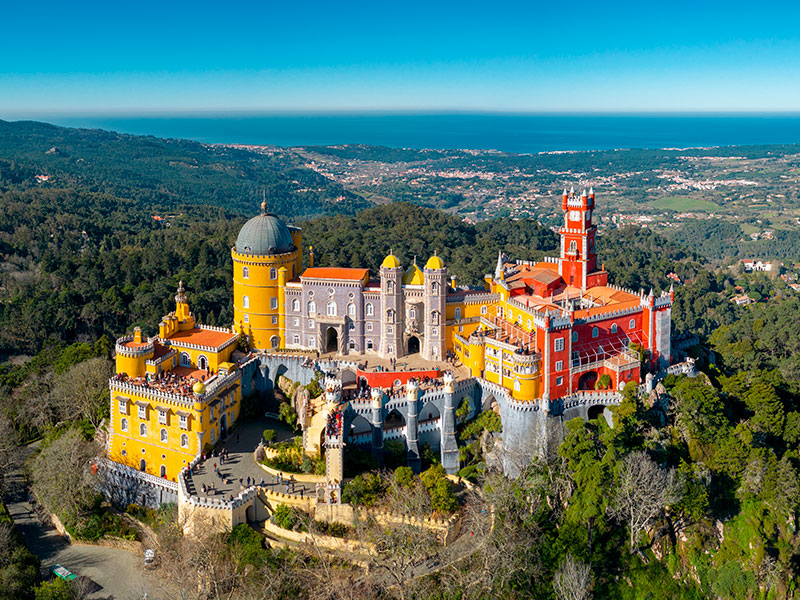
Cascais: A Beachside Oasis
For those looking to soak up the sun, the coastal town of Cascais offers golden beaches and crystal-clear waters. Easily accessible by train, this former fishing village has transformed into a chic beach resort but still retains much of its original charm.
Óbidos: A Walk Through History
The medieval town of Óbidos is another fascinating destination for history enthusiasts. Encircled by ancient walls, the town’s cobbled streets, and historic architecture make it a living museum. Don’t forget to try a sip of the local cherry liqueur, Ginjinha, often served in a chocolate cup.
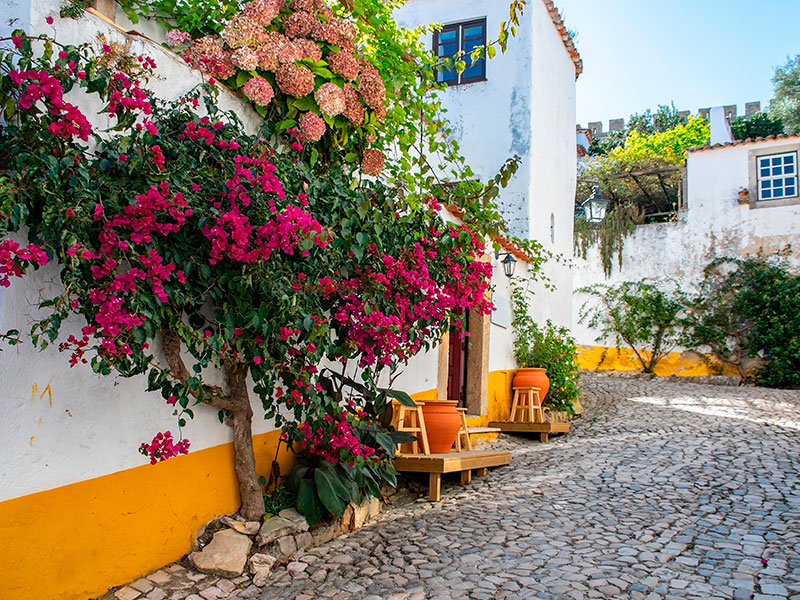
Fátima: A Spiritual Journey
For those interested in religious history, the pilgrimage site of Fátima is an essential visit. The site of reported Marian apparitions in 1917, Fátima attracts millions of visitors each year. A well-organized system of buses can whisk you from Lisbon to this spiritual locale.
Setúbal: For the Foodies
Food lovers will find their paradise in Setúbal, renowned for its seafood. A ferry ride across the River Sado takes you to this bustling port city, where you can indulge in local delicacies like cuttlefish and Azeitão cheese.
Arrábida Natural Park: An Outdoor Adventure
Nature enthusiasts should not miss a day trip to the Arrábida Natural Park. With its stunning beaches and hiking trails, it offers an outdoor experience like no other. Kayaking and snorkeling are also popular activities here.

The Alentejo Wine Region: A Toast to Portugal
Wine aficionados can venture into the Alentejo region, one of Portugal’s prime wine-producing areas. Tours are available that include tastings and vineyard visits, providing an in-depth look into the world of Portuguese wine.
Conclusion
Lisbon serves not just as a destination but as a gateway to the rich and varied landscapes, histories, and cultures that Portugal has to offer. Whether you’re an adventure-seeker, a history buff, or someone looking to unwind, the day trips from Lisbon offer something for every kind of traveler.
Seasonal Activities in Lisbon: A Year-Round Paradise for Tourists
Every Season, A Reason to Visit
In Lisbon, every season has its unique charm and a plethora of activities that reflect the city’s vibrant culture and stunning landscapes. Whether you’re visiting in the sultry summer or the mild winter, Lisbon offers an array of seasonal activities that will make your trip unforgettable.
Spring: The Blooming of Alfama
Spring is an ideal time to visit the Alfama district. The historic neighborhood bursts into life with blooming jacaranda trees, while its cafes and Fado houses begin setting up outdoor tables. Spring festivals, such as the Festas de Lisboa, offer unique local experiences featuring parades, music, and dance.
Summer: Sun, Sand, and Festivals
Summer in Lisbon is synonymous with beaches and festivals. From the urban beaches along the Tagus River to the scenic shores of Cascais, the options for sunbathing and water activities are abundant. Festivals like Super Bock Super Rock and NOS Alive light up the city’s musical landscape, offering a range of genres to enjoy.
Autumn: A Culinary Journey
Autumn is harvest season in Portugal, making it an excellent time for culinary explorations. Head to the Mercado da Ribeira or visit local vineyards to taste the season’s freshest produce, including a variety of wines and olive oils. The moderate temperatures also make it ideal for walking tours through the city’s historic districts.
Winter: A Season of Lights and Delights
While winter in Lisbon is milder compared to other European capitals, the city knows how to embrace the festive spirit. The Christmas markets, particularly the one at Rossio Square, are a treat for shoppers and gastronomes alike. Don’t miss the New Year’s Eve festivities, complete with fireworks over the Tagus River.
Whale Watching: A Seasonal Spectacle
Between April and October, take advantage of the seasonal whale-watching tours that depart from the marinas. Witness dolphins and various whale species in their natural habitat, an unforgettable experience that adds an adventurous edge to your Lisbon visit.
Birdwatching in the Tagus Estuary
If you’re an avid birdwatcher, the Tagus Estuary becomes a haven for migratory birds between September and March. Various guided tours are available to spot rare species and enjoy the natural beauty of one of Europe’s largest river deltas.
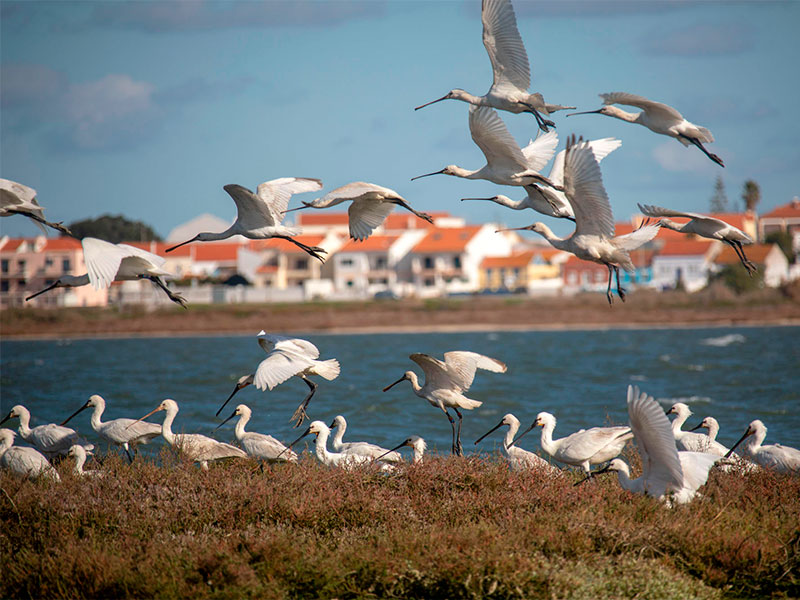
Skiing in the Serra da Estrela
While not directly in Lisbon, the Serra da Estrela mountain range offers skiing options for those visiting during the winter months. A relatively short drive from the capital, it provides a snowy contrast to Lisbon’s milder climate.
Conclusion
No matter when you choose to visit, Lisbon provides a rich tapestry of seasonal activities that cater to all tastes and interests. From the fresh blooms of spring to the culinary delights of autumn, each season brings its unique set of experiences that enhance the city’s natural charm and cultural richness.
Practical Information for Your Lisbon Trip: Plan with Confidence
Introduction
Traveling to a foreign city involves more than just exploring its landmarks and enjoying its cuisine. Knowledge of essential practical information can make or break your trip. From entry requirements to public services, this guide covers the nuts and bolts you’ll need for a seamless Lisbon experience.
Visa and Entry Requirements
Travelers from EU countries do not need a visa for short stays. Visitors from other countries might require a Schengen Visa, so it’s advisable to check the requirements well in advance. Make sure your passport is valid for at least six months from your planned return date.
Currency and Payments
The official currency is the Euro (€). Credit and debit cards are widely accepted, but carrying some cash for smaller establishments or public transportation is recommended. Numerous ATMs are available throughout the city for cash withdrawals.
Language Barrier
While Portuguese is the primary language, many locals, especially in the tourist industry, speak fluent English. However, learning a few basic phrases in Portuguese can enhance your experience and is generally well-received by locals.
Health and Safety
Lisbon is a relatively safe city, but as with any major tourist destination, taking basic safety precautions is advised. Most pharmacies (farmácias) are well-stocked, and hospitals offer good medical care. Travel insurance that includes health coverage is strongly recommended.
Weather and What to Pack
Lisbon enjoys a Mediterranean climate. Summers are hot and dry, so pack light clothing and sunscreen. Winters are mild but wet, necessitating waterproofs and layers. Always bring comfortable shoes suitable for Lisbon’s hilly terrain.
Connectivity
Wi-Fi is readily available in hotels, restaurants, and many public spaces. For longer stays, consider purchasing a local SIM card for mobile data. Most providers offer a variety of packages to suit your needs.
Public Restrooms
Public restrooms can be found at major tourist sites, shopping centers, and train stations. Some may charge a small fee, so having some coins handy is advisable.
Tipping Culture
Tipping is not mandatory but is appreciated. In restaurants, it’s customary to leave around 10% if you are satisfied with the service. Small tips are also common for taxi drivers and hotel staff.
Emergency Numbers
The general emergency number is 112. It’s a good idea to save this number and other essential contacts, such as your country’s embassy, on your phone and in written form.
Public Holidays and Closures
Take note of public holidays, as many attractions and businesses may be closed. Major holidays include New Year’s Day, Good Friday, and Portugal Day on June 10th.
Conclusion
Armed with this practical information, your trip to Lisbon should be as smooth as the city’s famous Pastéis de Nata. Whether it’s understanding entry requirements or navigating the local tipping culture, these tips are designed to help you travel through Lisbon with ease and confidence.
Lisbon Travel Guide: Top Tips for a Memorable Stay
Frequently Asked Questions (FAQs) About Visiting Lisbon
1. What is the best time to visit Lisbon?
The best time to visit Lisbon largely depends on what you’re looking for. Summers are warm and perfect for beach activities, while spring and autumn offer milder temperatures ideal for exploring the city. Winters are generally mild and less crowded.
2. Do I need a visa to enter Lisbon?
If you’re a citizen of an EU country, you don’t need a visa for short stays. For non-EU travelers, the visa requirements can vary, so it’s best to check with your local embassy.
3. What is the local currency?
The local currency is the Euro (€). ATMs are widely available, and most places accept credit and debit cards.
4. Is Lisbon safe for tourists?
Yes, Lisbon is generally considered safe for tourists. Common sense precautions like keeping an eye on your belongings in crowded areas are advisable.
5. How good is public transportation?
Public transportation in Lisbon is reliable and relatively easy to navigate. The system includes buses, trams, and a metro service that covers most of the city.
6. Are there any must-try foods?
Absolutely! You should not leave Lisbon without trying Pastéis de Nata, Bacalhau à Brás, or any of the city’s fresh seafood dishes.
7. Can I use my mobile phone in Lisbon?
Yes, Lisbon is well-covered by mobile networks. For extended stays, consider purchasing a local SIM card for more cost-effective data and calling rates.
8. What is the tipping etiquette?
Tipping is not mandatory but appreciated. In restaurants, a tip of around 10% is customary for good service.
9. What language is commonly spoken?
The official language is Portuguese. However, English is widely understood in areas frequented by tourists.
10. Is tap water safe to drink?
Yes, tap water in Lisbon is generally safe to drink. However, bottled water is readily available if you prefer.
11. Are there any local customs I should be aware of?
Portuguese people appreciate politeness and formal greetings. A simple “por favor” (please) and “obrigado” (thank you) can go a long way.
Conclusion: Discover the Allure of Lisbon, Your Next Dream Destination
As we’ve explored, Lisbon is a multifaceted city offering something for everyone, whether you’re a history aficionado, a food connoisseur, or a beach lover. From its iconic historical landmarks to its bustling shopping districts and vibrant nightlife, Lisbon promises a kaleidoscope of experiences that are both enriching and exhilarating. With an unparalleled blend of traditional charm and modern sophistication, this Portuguese capital captures hearts and engages senses in every season.
Our guide has aimed to cover every essential aspect, from what to see and do in each season to indispensable practical information. We’ve also tackled your most burning questions in our FAQ section, setting you up for a well-informed and unforgettable Lisbon journey. Whether you’re walking the historic corridors of Alfama, indulging in delectable local cuisine, or taking a day trip to a nearby coastal town, Lisbon guarantees an adventure like no other.
As you plan your trip, remember that Lisbon isn’t just a destination; it’s an experience waiting to unfold. Pack your bags and prepare for a memorable sojourn in one of Europe’s most captivating cities.



